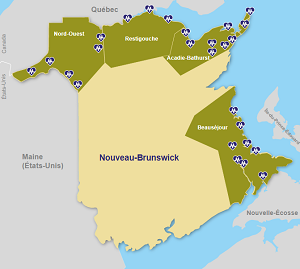Vitalité Health Network stays the course on Restigouche Hospital Centre transformation efforts
Campbellton, Thursday, February 6, 2020 – Vitalité Health Network summarized its efforts to date to transform the Restigouche Hospital Centre (RHC) into a modern mental health care facility with a culture focused on the delivery of high-quality recovery-oriented care and services.
Transformation
The President and CEO of the Network, Gilles Lanteigne, explained that the transformation process had been launched in March 2017 following the delivery of two reports requested from independent experts. “These exhaustive analyses clearly indicated that major adjustments were needed. With the support of the Board of Directors and the Department of Health, we resolutely embarked upon a long but necessary process leading to a change of culture,” Mr. Lanteigne indicated.
In February 2019, the New Brunswick Ombud published a report on RHC cases that had involved inappropriate care. The Department of Health then ordered a report from a national mental health expert, George Weber, to provide follow-up. In his report, delivered in May 2019, Mr. Weber made four recommendations to the Department of Health and six recommendations to the Network, all of which were accepted.
Consolidation of the provincial forensic psychiatry mandate
According to Jacques Duclos, Vice-President of Community Services and Mental Health, one of the priorities in recent months has been to consolidate the provincial forensic psychiatry mandate. The main achievements in this area include the following:
- Partnership with legal system stakeholders;
- Reduction of the average length of stay for court ordered evaluations;
- Reduction of the average occupancy rate;
- Provincial project to increase the number and supervision of community evaluations.
Mental health care continuum
In collaboration with its community partners, the Network redoubled its efforts to establish a provincial mental health care continuum. “We succeeded in reintegrating 64 patients into the community in 2018 and 47 patients in 2019. This was a colossal task and we are proud of our success,” Mr. Duclos emphasized. The Network acknowledges, however, that too many ALC (alternate level of care) patients still remain at the RHC.
“All these achievements advance a number of the recommendations made by the Ombud and follow-up measures contained in the Weber report,” Mr. Duclos stated.
Our patients: Priority on quality and patient safety
The President and CEO also summarized the main initiatives completed or underway to ensure the delivery of safe and quality care:
- Interdisciplinary care plans for over 80 percent of patients;
- Safety huddles on all units and implementation of the “Safewards” model;
- Joining the Mental Health and Addiction Quality Initiative (MHAQI);
- Monthly scorecard to monitor follow-up.
Our employees and physicians: essential human capital
Dr. France Desrosiers, Vice-President of Medical Services, Training and Research, outlined the most recent developments in employee training and recruitment:
- Priority on training: Needs inventory and employee training plan;
- RHC employee satisfaction level on the increase;
- RHC prioritized by psychiatrist team;
- Alternative funding plan (AFP) to improve psychiatrists’ working conditions (in process);
- Addition of locum psychiatric services and a postdoctoral program in psychiatry.
In conclusion, Mr. Lanteigne affirmed that much remained to be done to achieve all the transformation objectives but that he was proud of the achievements and success obtained to date. “We have made much progress and will stay the course on our transformation efforts.”

